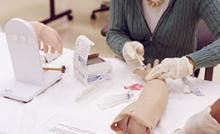Case Western Reserve University's Physician Assistant Program
Please note the PA Program website is the definitive source of information concerning the CWRU PA Program
Case Western Reserve University is proud to be developing an innovative, student-centered physician assistant program that will educate and train qualified individuals to be highly skilled members of the health care team. Utilizing a curriculum where learning is active, creative and continuous, the CWRU PA Program will provide students with the knowledge, skills and experiences necessary to become leaders in a world characterized by rapid change and increasing interdependence. This intensive 27-month graduate curriculum will award a Master of Science in Physician Assistant Studies degree upon completion.
The Physician Assistant program at Case Western Reserve University embodies the University’s commitment to creativity and innovation; civic and international engagement; and ethical behavior. The University as a whole strives to improve and enrich people’s lives by preparing graduates who manifest critical and creative thinking, effective communication skills, informed value judgments and who possess an educational foundation for continued growth and development in a changing world of diverse cultures and people.
The program design will utilize a hybrid blend of learning methodologies and styles including:
- Collaborative/Team-based learning
- Clinical simulations
- Case-based learning
- Problem-based learning
- Systems-based learning
- Experiential learning in the community
- Early clinical exposure
History of Case Western Reserve University's PA Program
Case Western Reserve University (CWRU) began its PA program planning process in the fall of 2012. The process began at the level of the School of Medicine (SOM) administration and was led by Dean Pamela Davis. Dean Davis attended medical school at Duke University in the early 1970’s, at a time when Dr. Eugene Stead could still be found rounding on the wards. Dean Davis was struck by the education and training of this new group of non-physician providers and how quickly they could enter clinical practice and apprentice with the primary care physicians who hired them.
Fast forward forty years and Dr. Davis is now dean of one of the top 25 medical schools in the nation. She is committed to excellence in medical education, biomedical research and clinical care and one of her three main goals is improving the health of the (Cleveland) community.
Case Western Reserve University views their PA program as an ideal way to expand healthcare workforce in Ohio and the United States. Building on a medical school with a strong reputation in curricular innovation as well as an already existing interprofessional infrastructure, the PA program is poised to provide well educated, medical professionals to Ohio and the U.S. Case’s PA trainees will assist in meeting the expanding population of patients accessing medical services as a result of an aging population and the projected shortage of physicians.
There are 59 counties in Ohio with Bureau of Health Professions designated health profession shortage areas (HPSA) in primary medical care (136 HPSAs). Cuyahoga County, where Cleveland and CWRU are located, has 16 HPSAs, the largest number of HPSAs of any county in the State of Ohio. All of these designated HPSAs are within 10 miles of CWRU.
The addition of the PA program capitalizes on the strengths of CWRU including, a talented, diverse and large faculty, a commitment to interdisciplinary team-based healthcare delivery and a partnership with Cleveland Clinic to build a new Health Education Campus (HEC) bringing together the University’s School of Medicine (including PA), School of Dental Medicine (SODM) and School of Nursing (SON) on one campus (opening in 2019). Learning in a team-based approach with other healthcare professionals will contribute to the quality of care available to citizens of the State of Ohio.
The CWRU PA program faculty were hired and the curriculum was developed in 2015. The founding director and faculty included:
- Director - Cynthia Booth Lord, MHS PA-C
- Medical Director - David Shafran, MD, MA
- Director of Didactic Curriculum - Hilary Petersen, MPAS, PA-C
- Director of Clinical Curriculum - Nancy Ivansek, MA, PA-C
- Director of IPE, Simulation and Outcomes - Casey Schroeder-Jenkinson, PhD
- Clinical Director of Professional Development - Josanne Pagel, MPAS, PA-C, DFAAPA, Karna RMT
The program matriculated its first class of 24 students in May 2016.


